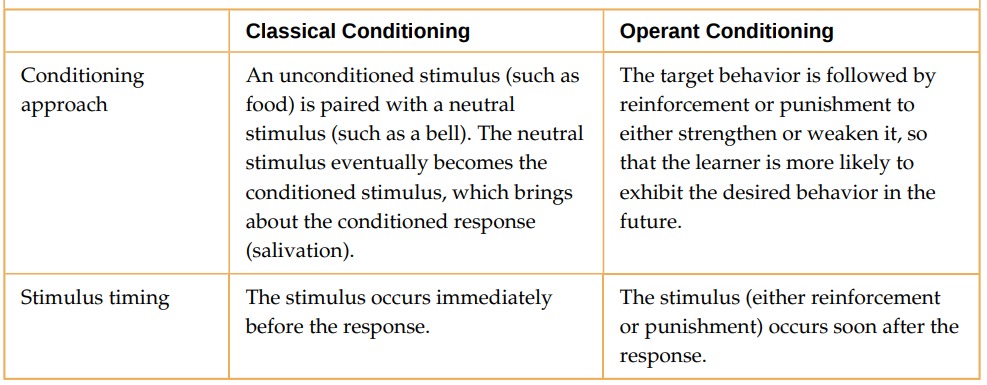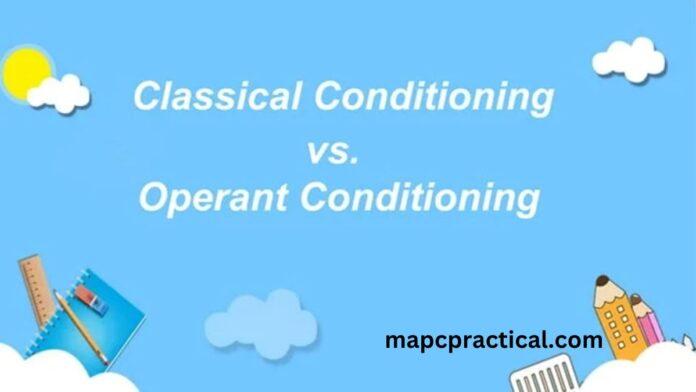Classical and Operant conditioning are both forms of learning in psychology, but they differ in the type of stimuli being learned from, the type of response being learned, and the consequences that follow the response.
Classical conditioning involves learning through associations between an involuntary response and a stimulus.
For example, if a person associates the sound of a bell with food (unconditioned stimulus), then the sound of the bell alone (conditioned stimulus) will elicit the salivation response (conditioned response).
Operant conditioning involves learning through the consequences of a behavior. If a behavior is followed by a positive consequence (reinforcement), the behavior is more likely to occur in the future. If the behavior is followed by a negative consequence (punishment), the behavior is less likely to occur in the future.
For example, a child who is praised (reinforced) for doing well on a test (behavior) is more likely to study hard in the future. If the child is scolded (punished) for not studying, they are less likely to repeat that behavior.
Ten major differences between operant and classical conditioning :

- Operant conditioning focuses on voluntary behaviors while classical conditioning focuses on involuntary behaviors or reflexes.
- Operant conditioning deals with consequences and responses while classical conditioning deals with events that precede responses.
- Operant conditioning deals with rewards and punishments while classical conditioning does not.
- Operant Conditioning deals with stimuli from outside sources while Classical Conditioning does not.

- Operant Conditioning relies on schedules of reinforcement while Classical Conditioning does not.
- Operant Conditioning deals with increasingly more intense stimuli while classical conditioning does not;.
- Operant conditioning rewards behaviors that are self-determined and difficult to resist while classical conditioning rewards reflexes that are involuntary, easy to initiate, and difficult to resist.
- Operant Conditioning is produced by an individual’s awareness of a consequence or reward while Classical Conditioning isn’t produced by the individual himself.

- Operant conditioning is implicative of self-determination while Classical Conditioning is not.
- Operant conditioning works best with animals that show a clear and measurable response while Classical Conditioning doesn’t work well with animals that don’t respond so easily.
Let’s look at some situations to determine the conditioning
- Your father gives you a credit card at the end of your first year in college because you did so well. As a result, your grades continue to get better in your second year.
Is this an example of classical conditioning or operant conditioning?
This is an example of operant conditioning because school performance is voluntary behaviour.
- The credit card is a positive reinforcement because it is given and it increases the behaviour.
- Your car has a red, flashing light that blinks annoyingly if you start the car without buckling the seat belt. You become less likely to start the car without buckling the seat belt.
- Is this an example of classical conditioning?
- This is an example of operant conditioning because buckling a seat belt is voluntary.
- The flashing light is a punishment.
- The consequence is given.
- The behaviour of not buckling the seat belt decreases.
- You eat new food and then get sick because of the flu. However, you develop a dislike for the food and feel nauseated whenever you smell it.
- Is this an example of operant conditioning?
- This is an example of classical conditioning because nausea is an automatic response.
- The flu is the US.
- Nausea is the UR.
- The new food is the CS.
- Nausea to the new food is the CR.
- Your hands are cold so you put your gloves on. In the future, you are more likely to put gloves on when it’s cold.
- Is this an example of classical conditioning?
- This is an example of operant conditioning because putting gloves on is voluntary behaviour.
- The consequence is negative reinforcement because the coldness is taken away and the behaviour of putting on gloves increases.
- You check the coin return slot on a pay telephone and find a quarter. You find yourself checking other telephones over the next few days.
- Is this an example of classical conditioning?
- This is an example of operant conditioning because checking the coin return slot is voluntary behaviour.
- The quarter would be a positive reinforcement because it was given and it led to an increase in the behaviour.
- An individual receives frequent injections of drugs which are administered in a small examination room at a clinic. The drug itself causes increased heart rate; however, after several trips to the clinic, simply being in a small room causes an increased heart rate.
Is this an example of classical conditioning?
Yes, This is an example of CC because the increased heart rate is an automatic response.
- The drug is the UCS.
- The accelerated heart rate is the UCR.
- The small room is the CS.




